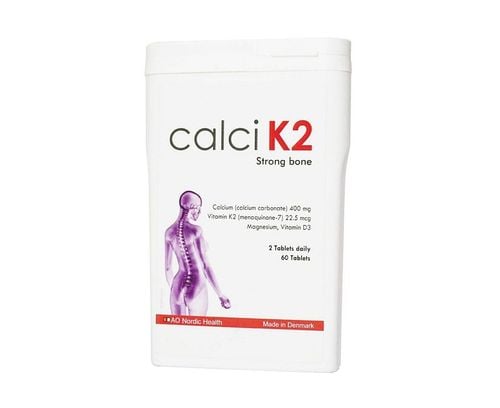This is an automatically translated article.
Calcium is an important mineral for the development of children. A 1-year-old child has a relatively rapid growth in height and weight, so the need for calcium will also be high. However, parents need to know how much calcium a 1-year-old child needs each day to supplement appropriately, avoiding excess or deficiency can adversely affect the child.
1. The role of calcium in the body
Calcium is a mineral that is essential for building strong bones and teeth of children, neuromuscular transmission and is a factor that supports blood clotting. Because 1-year-olds are developing bones, they need an adequate and steady supply of calcium to support healthy growth.
When calcium deficiency will be rickets, affecting the development of bones, teeth grow slowly, or startle or cry while sleeping, tossing and turning, and making the baby's immune system not develop. full. However, if not supplemented with sufficient science, children are also at risk of excess calcium, leading to manifestations such as nausea, constipation, bone pain, kidney stones, decreased absorption of some other minerals. for the body, especially it affects neuromuscular transmission...
Calcium is very necessary for children, but parents also need to know the appropriate supplement for their age. Do not add too much or too little because it is harmful to the child's body.
2. How much calcium does a 1-year-old child need each day?
In each stage of development, the body needs a certain amount of nutrients according to its age. So how much calcium does a 1-year-old baby need each day? It is recommended that children from 1 to 3 years old need 500mg of calcium per day. Usually the supplement cannot be exact every day, but is usually averaged over about 1 week.
Calcium supplementation for children is often encouraged through eating. Foods with rich sources of calcium such as meat, fish, eggs, milk and dairy products, shrimp, crab, cabbage, some nuts... should be added to the baby's diet.

Canxi cho trẻ 1 tuổi cần bổ sung gì có thể thông qua thực phẩm giàu canxi
3. Notes when supplementing calcium for children
In order to provide calcium for children in the most effective and safest way, it is necessary to note a number of issues such as:
The best option is to supplement calcium for children through calcium-rich foods. Especially in children who eat well and are not anorexic. Attention should be combined with adequate vitamin D supplementation for children. Vitamin D3 is an essential substance for the absorption of calcium in the digestive tract and helps in the metabolism of calcium in the bones. In order to provide calcium for children effectively, it is necessary to pay attention to supplementing with vitamin D. A simple and effective way to supplement vitamin D is to let children sunbathe properly and let the child's body synthesize the vitamin itself. D. In addition, if in areas with little sunshine, it is possible to supplement the dose for children through supplementary products, this period from 1 to 3 years old children need about 600UI per day. Avoid misunderstandings about the symptoms of calcium deficiency: Many parents see their children being restless at night, tossing and turning in sleep, delayed teething, hair loss in the shape of a scarf...thinking that their children are deficient in calcium. In fact, there are many other medical conditions that also lead to these symptoms. Therefore, parents need to find out the cause, avoid thinking that the child lacks calcium and arbitrarily supplementing the child in an unscientific way, especially in children with a varied and nutritious diet. For children who are lazy to eat, and the risk of deficiency due to an unsafe diet, parents should take the child to a medical facility for examination and advice when starting to supplement with functional foods. other nutrients.
If children use calcium supplements, they should be used at the right time, namely in the morning after eating, exercising after taking calcium and giving them plenty of water to drink. Do not take calcium supplements when hungry, late afternoon or evening, because it will increase the risk of kidney stones because the child sleeps without exercise, so calcium absorption into the bones is difficult, from which it will be excreted by the kidneys and cause problems. gravel. Children are a fast growing age and need to be provided with adequate nutrients through food and supplements. What should a 1-year-old child supplement with is a question that every parent wants to know to provide the most comprehensive child and calcium is an essential nutrient that parents need to pay attention to. However, at each age, calcium supplements will be needed in different amounts, so it is best for parents to consult with doctors and nutritionists before supplementing for children.
In addition to calcium, children need to be supplemented by their parents with necessary micronutrients: Zinc, selenium, chromium, vitamins B1 and B6, ginger, acerola fruit extract (vitamin C),... to improve taste, eat well, reach the correct height and weight, and exceed the standard, have a good immune system, strengthen the resistance to get sick less often and have less digestive problems.
Also according to leading nutrition experts, parents need to be calm and persistent when supplementing with nutrients for children, even through eating or functional foods. In particular, the use of functional foods should choose those of natural origin that are easily absorbed, do not allow children to use many types at the same time or continuously change the types of functional foods. Besides, nutrition experts also emphasized on the role of biological zinc; Parents should learn and supplement zinc for children properly at the appropriate time, to avoid zinc deficiency affecting the comprehensive development of children.













